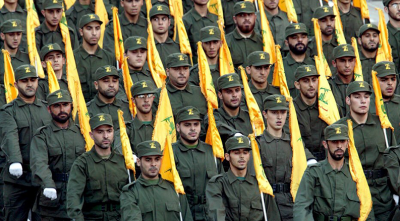Fresh U.S. Sanctions Against Hezbollah Make Lebanon Weakened and Divided Against Israel

All Global Research articles can be read in 51 languages by activating the “Translate Website” drop down menu on the top banner of our home page (Desktop version).
Visit and follow us on Instagram at @crg_globalresearch.
***
The U.S. Treasury Department announced on May 11 new sanctions against Hezbollah. Washington continues to attack the finances of the Shi’ite party via the Treasury Department’s Office of Foreign Assets Control (OFAC) to undermine the groups influence and to maintain perpetual economic chaos and political division in Lebanon.
According to the Treasury Department, Al-Qard al-Hassan is the financial wing of Hezbollah that oversees the groups “overall budget and spending, including the group’s funding of its terrorist operations and killing of the group’s opponents.” Those targeted by the sanctions have reportedly transferred more than $500 million to Hezbollah despite sanctions. Andrea Gacki, director of OFAC, said that Hezbollah continued “to abuse the Lebanese financial sector” and that such actions demonstrate the groups “disregard for financial stability, transparency, or accountability in Lebanon.”
The message from the Joe Biden administration to Hezbollah was clear: they do not want the Iranian-backed party to have financial autonomy that will allow it to fully dominate the political scene.
After classifying the movement as a terrorist organization in 1995, Washington made its first sanctions against them a year later. Amato-Kennedy’s law sanctioned Syria and Iran for supporting the Lebanese movement. However, since then, the measures taken by Washington have been increasingly targeted.
Seeking at all costs to cut Hezbollah’s funds, the U.S. government has already carried out a series of coercive measures against several personalities close to the group. In 2015, President Barack Obama enacted the “Hizballah International Financing Prevention Act.” This decree made it possible to freeze assets in the U.S. belonging to any individual or entity suspected of financing Hezbollah or of having any connection to them.
Since then, American authorities have directly sanctioned party leaders. Last September, the U.S. Treasury targeted two Lebanese figures – former Transport Minister Youssef Fenianos and former Finance Minister Ali Hassan Khalil – and accused them of having helped the Shi’ite group. Hezbollah reacted by asserting that “everything that emanates from this (American) Administration is condemned and rejected.”
Lebanese banks, which were trying to respect American directives, were tempted, for political and commercial reasons, to look away and allow such operations to be carried out for the benefit of Hezbollah. At the same time, the U.S. did not attempt to control Lebanese banks as they find themselves trapped by their own contradictions. Washington therefore did not hesitate to plunge Lebanon into an even deeper banking and economic crisis to attack Hezbollah.
By means of these new sanctions, and fearing an all-powerful Hezbollah, American logic is ultimately to make the Shi’ite party unpopular in the eyes of the Lebanese people – a policy which is also based on various forms of pressure.
In fact, regardless of economic sanctions, Washington has implemented a series of measures aimed at undermining Hezbollah’s influence. Through an associative, educational and journalistic network, American public diplomacy is trying to damage the image of the Shi’ite party. Washington has therefore funded a local humanitarian organization, the MEPI (Middle East Partnership Initiative) to counter the actions undertaken by the pro-Iranian movement. But this funding also affects hostile political parties, as well as local and regional media.
Countries which oppose Iranian influence in Lebanon and the wider region have panoply of means to contain this influence. In addition, U.S. leaders are reportedly pressuring its European partners to include Hezbollah in their list of terrorist organizations. After the United Kingdom, Germany and Serbia, Latvia granted this request last December, a decision hailed by Washington
But the question remains whether such pressure can break Hezbollah’s significant political, economic and military control over Lebanon.
Such measures do next to nothing to alleviate the significant political and economic crisis in Lebanon. A weak and divided Lebanon means that Iran (through Hezbollah) cannot gain full control of the country. Although Hezbollah says its purpose of existence is to destroy Israel, one would imagine that the current conflict between the Israeli military and Gazan militants, in addition to the breakdown of civil society as mobs of Jewish and Muslim Israeli citizens attack each other, provides Hezbollah an opportunity to embark on its self-proclaimed ambition. Yet, after many days of conflict between Palestinian militants and the Israeli military, Hezbollah is yet to make a move against what it calls the Zionist Entity.
This would suggest that U.S. sanctions and pressure to keep Lebanon weakened and fragmented achieved its goal of pacifying a major threat against Israel. As long as threats against Israel emanate from Lebanon, Washington will ensure that the country will remain in a state of permanent crisis, and the latest sanctions are a testament to that fact.
*
Note to readers: Please click the share buttons above or below. Follow us on Instagram, @crg_globalresearch. Forward this article to your email lists. Crosspost on your blog site, internet forums. etc.
Paul Antonopoulos is an independent geopolitical analyst.
Featured image is from LobeLog

